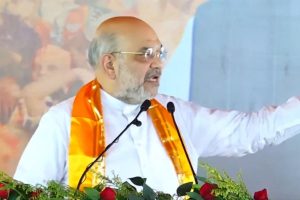Twenty years ago, the highpowered Raghavan Committee on Competition Law, 2001 recommended that a positive approach is necessary on the part of government and professional institutions to ensure that Indian professionals and professional firms grow to become globally competitive. Professional bodies should not utilise their autonomy to counter the normal challenges of global integration and it is illogical to have a totally protected profession in an environment of global industrial integration.
Later, in pursuance to the Recommendations of the Committee on Regulation of Private Companies and Partnerships (Naresh Chandra Committee Report II, 2003), the Limited Liability Partnership Act, 2008 was enacted to restrict the liability of partners in professional partnership and with a vision to empower our professional firms to provide services globally.
Now, multidisciplinary partnerships (MDP) are being permitted and Chartered Accountants, Company Secretaries, Cost Accountants, Advocates, Actuaries, Engineers and Architects can work together under a roof to provide one-window professional service to their corporate clients. A brave world is waiting for them. Recently, a bill has been passed in Parliament, to amend the LLP Law with an objective to sharpen the edge of multidisciplinary start-ups and to improve the ease of doing business.
Advertisement
Need of the hour is fearlessness, integration of skills and reorientation in approach. The New Education Policy (NEP), 2020 has envisioned a globally competitive professional education system. In Part III, clause 20, the policy noted that professional education becomes an integral part of the overall higher education system. All institutions offering either professional or general education will aim to organically evolve into institutions/clusters offering both seamlessly, and in an integrated manner by 2030.
The policy specifically elaborated its visionary zeal about agricultural, legal, health care and technical education but, as such, the policy has no specific roadmap for three professional institutes, the Institute of Chartered Accountants of India (ICAI), Institute of Company Secretaries of India (ICSI) and the Institute of Cost and Management Accountants of India. All three function under the administrative control of the Ministry of Corporate Affairs and contribute in nation-building.
Their members play statutory roles under the Companies Act, 2013 to ensure transparency, accountability and wealth creation. While emphasizing the multidisciplinary approach, NEP recognizes in general that preparation of professionals must involve an education in the ethic and importance of public purpose, an education in the discipline, and an education for practice. It must centrally involve critical and interdisciplinary thinking, discussion, debate, research, and innovation.
For this to be achieved, professional education should not take place in the isolation of one’s speciality. The policy further elaborated that professional education should aim to become multidisciplinary, offering holistic education. These three institutes of national importance have to adopt this holistic aspiration and vision to empower themselves. Debates on the scope of emerging opportunities for these professions and their accountability to stakeholders are on and a view is evolving that reform is needed in the core functioning of these Institutes.
However, except the disciplinary mechanism and other urgent issues relating to the professions, the Central Government rarely applied its mind to reform the overall functioning of these Institutes. Though there are no regular classes for students, these three institutes, ICAI, ICSI and ICMAI are imparting relevant education through correspondence type modules with mandatory on-the-job practical training, and skill as well as knowledge development programmes on IT, Communication, presentation, revision of course contents and regulating the professions as well.
In case of legal, medical and most other professions, universities/colleges impart education and regulatory bodies like Bar Council of India and National Medical Commission (earlier Medical Council of India) regulate the professions with a role in permitting universities/colleges to run courses and in prescribing curriculum. ICAI, ICSI and ICMAI were constituted under Acts of Parliament, namely The Chartered Accountants Act, 1949, The Company Secretaries Act, 1980 and The Cost and Works Accountants Act, 1959.
From time to time, amendments have been made. Amendments have empowered the Central Government to constitute Independent Peer Review Boards to enhance the quality of services provided by members of these Institutes. In USA, the Sarbans Oxley Act, 2002 was enacted after the Enron debacle in 2001. In India, consequent to the Satyam scam in 2009, the National Financial Reporting Authority (NFRA) was constituted under Section 132 of the Companies Act, 2013 with the objective, inter alia, of curtailing the disciplinary power of ICAI.
Empowering NFRA and enactment of National Medical Commission Act, 2019 dissolving the scamtainted Medical Council of India is a message to all our professional bodies to improve their functioning and accountability. Further empowerment of NFRA is required to extend and strengthen its jurisdiction to free all three institutes, ICAI, ICSI and ICMAI gradually from their disciplinary functions so far as it relates to prescribed categories of bodies corporate or persons for committing professional or other misconduct by any member or firm of these professionals, to enable them to focus their resources primarily on imparting quality education and improvement of skills of members and students.
This will improve the confidence of all stakeholders including investors. The geographical world is now a virtual world. These professions have to reinvent themselves as holistically outlined in NEP. The popular expectation is that the power to impose punishment for committing professional or other misconduct by these professionals should not be delegated to these autonomous professional bodies. Once these institutes are liberated from burdensome disciplinary responsibilities, they could comfortably focus on education and on projecting their members across the globe.
They will continue their other regulatory responsibilities relating to members and students as prescribed in the Acts. One further aspect requiring immediate attention is to democratize their functioning and improve the rationality of decisions. The respective Councils of these three Institutes are policy-making bodies. The Council is comprised of Members elected by fellow professionals and nominees of the Central Government. Democratic norms always require representatives from all stakeholders to appreciate various issues relating to them.
In these Councils, all the elected members are representatives of members and there are others nominated by the Central Government to represent the interest of the Government/Corporates /Industries/Shareholders. Unfortunately, the governance system prescribed by the three Acts has no provision for elected or nominated members from two important groups, students and employees. Numbers of students are much more than of members. Their participation in the policymaking process could not be waived on any excuse as that will be at the cost of sanctity of the governance system.
This serious lapse in the governance system causes unrest, litigation and injures the functioning of the Institutes. The Regional Councils of these Institutes are statutory bodies and have to be empowered to facilitate decentralisation. Presently, the functions of Regional Councils are restricted primarily to the organisation of continuing professional education programmes for members and a few programmes for students. The Central Government may also advise simplification of existing election procedure for Council and Regional Council of these three Institutes, especially of ICAI, as such a move could save money and effort.
A digitized mode of election is the need of the hour and no one can stop that idea in the long run. Professional Institutes should be governed with the best possible norms and structures. Earlier, there was an idea to merge these three Institutes and in the context of NEP, that idea of integration with multidisciplinary edges could be debated again. Statutory Audit, Secretarial Audit and Cost Audit could be the specializations of the same course, whereas Management Consultancy and other lucrative emerging areas would be the common practice domain.
Professional firms in India are acutely suffering in networking. Undue concentration of proprietary firms is another impediment for growth. Most of the qualified professionals are eager to join service as practice is not so attractive. These institutes have a responsibility to address this issue. India can rightly boast of the numbers of its professionals having expertise and Englishlanguage skills. We could lead the world and set a benchmark for the developed countries. Emerging new India is waiting for empowered professionals and implementation of NEP would make it a reality.
(The writer is a lawyer, author and former Regional Office Head of the Institute of Chartered Accountants of India)
Advertisement










